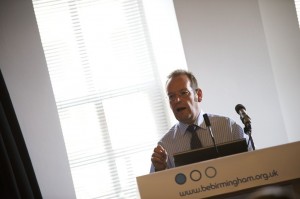First meeting of the Total Place pilots
Posted on August 28th, 2009
On the 16th of July, leaders from the 13 pilots met as a group for the first time. Hosted by Birmingham City Councils and colleagues from BeBirmingham, the day was framed around the potential ‘wins’ to be had from Total Place. Stephen Hughes, Chief Executive of Birmingham City Council, welcomed everyone to the event how to buy viagra in canada buy cheap viagra canada and set out Birmingham’s aspirations for their work in Total Place.

Stephen Hughes, Chief Executive of Birmingham City Council
John Atkinson, Managing Director of the Leadership Centre explained the national context of Total Place and how it connected to other organisations (see the Who’s involved page for more information). He also introduced Holly Wheeler, Learning and development manager at the Leadership Centre, who will be leading the knowledge management aspect – how we learn from this and other work and how it will be shared (see the Learning page for more information).
The leaders then came together to talk about their own local challenges and how Total Place might address these challenges.

Jon Rouse, Chief Executive of London Borough of Croydon

Barry Quirk, Chief Executive of London Borough of Lewisham
Reflecting on the event, Stephen Hughes said:
“Total Place has the potential to be a step change in service standards as well as enabling local areas to respond positively to the current economic and financial crisis. The event was an excellent opportunity to exchange ideas and learn from each other how we were going to grasp this opportunity. By working together as local areas and with central government we have begun to show how true partnership can deliver for all our people.”
Birmingham City Council’s Director of Policy & Delivery, Jason Lowther, said:
“This event demonstrated the huge energy, commitment and innovation that local authorities and their partners are bringing to Total Place. And it signalled that key parts of central government are also strongly committed. As a programme TP builds on the best of developments like Local Strategic Partnerships, LPSAs and Local Area Agreements. Partners at local level have matured to a stage where we are ready to take more responsibility for delivering outcomes across local places, and Total Place offers a helpful framework to work out how that can accelerate quickly. The imminent constriction of public spending adds extra impetus to the need to make this work, because by working better together we can deliver these key outcomes much more cost-effectively”.
The energy and enthusiasm shown at the Birmingham event demonstrates the power of the collobrative nature of this work. The leaders will be meeting again in Leicester on the 2nd of September.
All photos copyright Andy Smith Photography.
Category: news




At long last we have a name and top down commitment for something I looked at 10 years ago. In 1999 we ‘GeoCoded’ the entire 30,000+ population of our secondary schools to enable a deprivation analysis as part of an Excellence in Cities bid. As a follow on we looked at identifying the spend per pupil going into relatively small geographic areas to put together with data from other bodies to create a ‘Total Place’ picture. GIS was truly used as the ‘G’lue ‘I’nbetween ‘S’ystems. To this day I am still being asked “should we collect this data at Ward level or Neighbourhood Area level?” and my answer remains the same as then – “You do neither. Collect what happened, where it happened and when it happened”. This concept of ‘What, Where, When’ would not only support Total Place but also copes with those regular changes to Ward boundaries. Recasting say the last 5 years worth of data against newly defined Ward boundaries is much better than any proportional fudging.
Comment by Brian J Garner — September 2, 2009 @ 1:54 pm